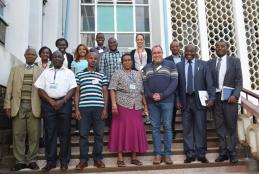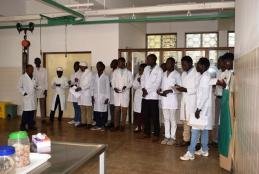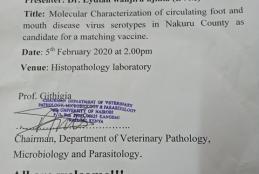Latest News & Announcements
COVID SEMINAR SERIES : HEALH DIPLOMACY AND THE FIGHT AGAINST COVID-19 PANDEMIC
Date: Thursday, 7th May 2020
Time: 10 am to 12 pm
Venue: BlueJeans App(online)
Link: https://bluejeans.com/833977035?src=calendarLink
Speakers
Dr. Wala Elizabeth (Programme director,
Health Systems Strengthening, AMREF
Health Africa in Kenya )
Dr. Peter M. Mwencha (CEO, The
International Relations Society of Kenya)
POULTRY TRAINING FOR ILRI STAFF
A three-day poultry training was held for ILRI staff from 25th to 27th February 2020 at department of Veterinary Pathology, Microbiology and Parasitology, Faculty of Veterinary Medicine, College of Agriculture and Veterinary Sciences, Upper Kabete. The training covered various aspects, including: poultry handling; poultry anatomy and physiology; bird inoculation routes; post-mortem procedure; sample collection and transportation; handling of samples and media inoculation at the laboratory; biosafety and biosecurity; and aspects of animal welfare.
- Read more about POULTRY TRAINING FOR ILRI STAFF
- Log in to post comments
ACADEMIC VISIT BY MERU UNIVERSITY STUDENTS
Meru University of Science and Technology students on Friday 7th February 2020 Visited the dept of Vet.Pathology, Microbiology and Parasitology for an academic trip whereby they were taken through practical demonstrations in Veterinary Histopathology.
- Read more about ACADEMIC VISIT BY MERU UNIVERSITY STUDENTS
- Log in to post comments
MSC PROPOSAL PRESENTATION
PRESENTER :
DR. LYDIA WANJIRU NJIHIA
TITLE :
MOLOCULAR CHARACTERIZATION OF CIRCULATING FOOT AND MOUTH DISEASE VIRUSE SEROTYPES IN NAKURU COUNTY AS CANDIDATE FOR A MATCHING VACCINE.
DATE :
5th FEBRUARY 2020
TIME :
2:00PM
VENUE :
HISTOPATHOLOGY LABORATORY, PATHOLOGY BUILDING.
- Read more about MSC PROPOSAL PRESENTATION
- Log in to post comments
THIKA T.T.I STUDENTS VISIT TO THE DEPARTMENT
- Read more about THIKA T.T.I STUDENTS VISIT TO THE DEPARTMENT
- Log in to post comments
ACADEMIC TOUR BY KTTC STUDENTS IN THE DEPT OF VET.PATHOLOGY
examination dates
- Read more about examination dates
- Log in to post comments






